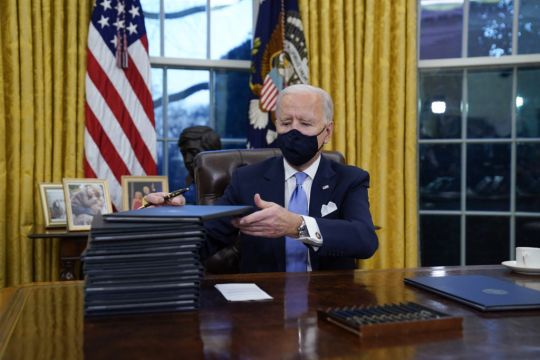US President Joe Biden is set to issue an executive order to reverse a Pentagon policy that largely bars transgender individuals from joining the military.
The move will overturn a ban ordered by President Donald Trump in a tweet during his first year in office, a person briefed on the decision said.
Mr Biden has been widely expected to overturn the Trump policy in his early days in office.
The White House could announce the move as early as Monday, according to the person briefed on the decision who spoke on the condition of anonymity.
The plan to reverse the policy has the support of Mr Biden’s newly confirmed defence secretary, retired Army General Lloyd Austin, who spoke of the need to overturn it during his Senate confirmation hearing last week.
“I support the president’s plan or plan to overturn the ban,” he said.
“If you’re fit and you’re qualified to serve and you can maintain the standards, you should be allowed to serve.”
The decision comes as Mr Biden plans to turn his attention to equality issues that he believes continue to shadow nearly all aspects of American life.
The move to overturn the transgender ban is also the latest example of Mr Biden using executive authority in his first days as president to dismantle Mr Trump’s legacy.
His early actions include orders to overturn a Trump administration ban on travellers from several predominantly Muslim countries, stop construction of the wall at the US-Mexico border, and launch an initiative to advance racial equality.

It is unclear how quickly the Pentagon can put a new policy in effect, and whether it will take some time to work out details.
Until a few years ago service members could be discharged from the military for being transgender, but that changed during the Obama administration.
In 2016, Defence Secretary Ash Carter announced that transgender people already serving in the military would be allowed to serve openly, and the military set July 1, 2017, as the date when transgender individuals would be allowed to enlist.
After Mr Trump took office, however, his administration delayed the enlistment date and called for additional study to determine if allowing transgender individuals to serve would affect military readiness or effectiveness.
A few weeks later, Mr Trump caught military leaders by surprise, tweeting that the government would not accept or allow transgender individuals to serve “in any capacity” in the military.
“Our military must be focused on decisive and overwhelming victory and cannot be burdened with the tremendous medical costs and disruption that transgender in the military would entail,” he wrote.







